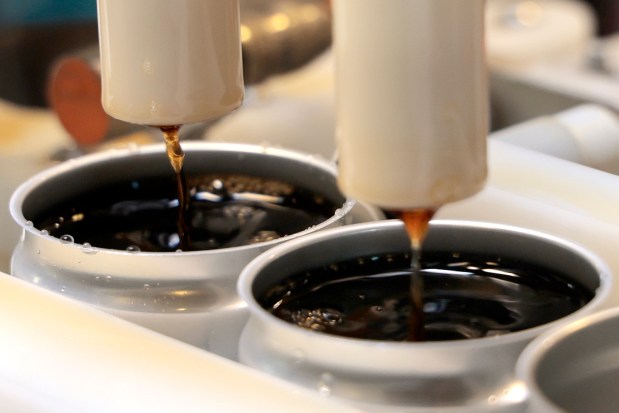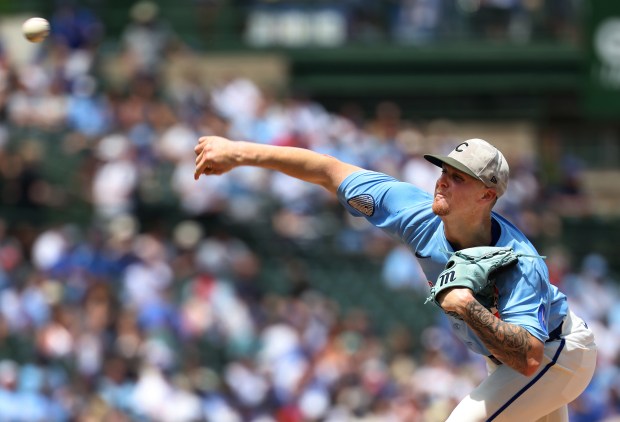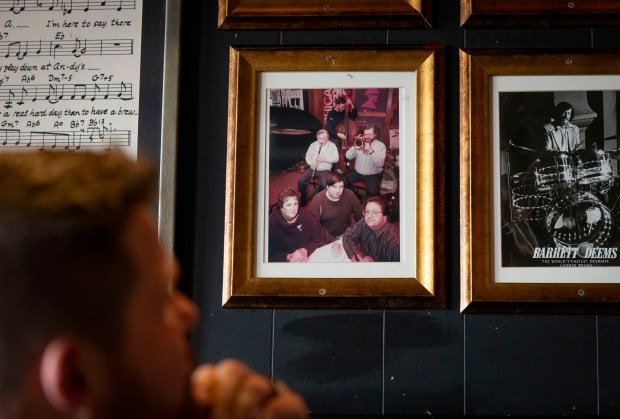The process of canning coffee at Dark Matter’s Chocolate City Coffee Palace and Bodega on Grand Avenue feels surprising yet familiar. There’s a giant paper filter. Fresh roasted and ground coffee beans go in. Then 200-degree water is added. It’s all dialed-in, at a giant size.
Science and engineering come knocking at every step after: The coffee is rapidly chilled via a system of parallel tubes, counterflow and heat exchange. This is not “cold brew” — increasingly, some top coffee producers argue that the best beans require hot water to get the most precious flavor compounds. Technically speaking, Dark Matter does not serve cold brew in any form at its cafes in Chicago; it’s “coffee cold,” a bit of linguistic gymnastics.
Once it’s brewed and briefly stored in a 50-gallon refrigerated kettle, the coffee moves to the canning line. Labels for different roasts or brewing styles must be firmly attached to the correct can. Negative space must be filled by nitrogen. Why nitrogen? Don’t worry about it, honestly. The seal must be good. Canning facilities must be sanitized and sanitized and sanitized. By the end of the day, it smells wonderfully roasty, but the equipment has been washed and cleaned so much, it also evokes a fresh shower.
It’s an industrial effort. I drink coffee every single day, but late-night drives are the only time I justify purchasing a can for its convenience. I wondered: Who is the customer for black coffee in single-serving cans? Dark Matter always has at least four cold brew cans available, including their flagship Chocolate City.
Robert “Bob” Quinlan, president of Dark Matter, who explained the canning process to me with his two decades of experience in coffee and beer, shared my line of questioning. I noticed cans didn’t exactly fly off the shelves at Dark Matter locations; Quinlan said they’re more popular when sold at groceries, restaurants or online. But he’s confident; the customers will come. Especially young people.
“If they’re exposed to (cans) when they’re exposed to coffee, is this going to be their go-to instead of hot?” Quinlan mused. “I don’t know. I’m too old.” For the first time, I imagined that future where a house guest asks not for a carafe of hot brew or a pod in a machine — but a cold can of black coffee.
Ready-to-drink is ready to grow
Since the pandemic, ready-to-drink options have become the third most popular form of coffee drinking for daily drinkers. The growth has been rapid since 2023, rising from 8% to 15% of coffee drinkers who were polled about their preferred preparation in the past day, according to the National Coffee Association’s Coffee Data Trends for spring 2024. The most popular forms of coffee preparations for daily drinkers are still drip and single-cup machines such as Keurig and Nespresso. The National Coffee Association’s data also showed Gen Z and millennials were more likely to drink specialty and RTD coffee.
But customer recognition is still lagging. Whitney Baldwin, an assistant manager at Ancient Grounds, was brewing a pretty fancy-looking three-cup sampler for a customer while I told her about my reporting. The store offers refrigerated juices and iced teas, but no cold coffee.
“I’ve never had a customer come in here and ask for cold brew in a can,” Baldwin said.
Still, one thing is for sure: “It’s not a fad,” Quinlan said. “It is definitely a place where we want to grow; and we have seen a good amount of growth since we started canning.” In Quinlan’s view, any customer who drinks a Red Bull or energy drink in the morning and might be convinced to adopt a sugar-free alternative is a potential customer.
Other local specialty coffee roasters also see canned coffee as an important sector for growth, customer development and brand name recognition. Dark Matter is a rare Chicago-area company that acquired canning equipment to package RTD coffees in-house. Other companies, including Big Shoulders, Metropolis, Metric, Intelligentsia, Beatrix and Four Letter Word, are increasingly working with “co-packers” or “co-manufacturers” that offer services including canning, cold brew kegs and flash-chilling hot coffee.
Representatives from Beatrix, Kyoto Black and La Colombe all said 2024 was a year of expansion for them with rebrands, new co-packing contracts and big launches to match increasing demand in the Chicago area.
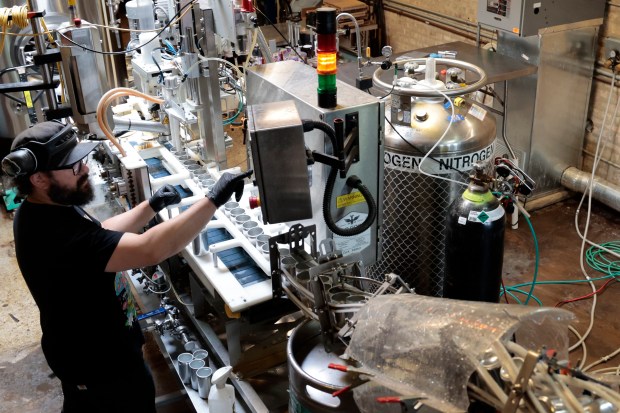
In some ways, the trend is a long-overdue catchup. Canned coffee was first popularized by the Japanese company UCC in the 1960s. Starbucks argues they were first to the U.S. ready-to-drink coffee market in 1996 when they began selling bottled versions of the Frappucino. They collaborated with PepsiCo, forming the North American Coffee Partnership. Starbucks has a diverse lineup now, including cold brew, and still looms over the space, dominating with 41% market share in mid-2022 according to Statista.
But it’s becoming more common to find canned coffee sold black from “third-wave” producers or companies that focus on specialty coffee, meaning beans that have been graded at the highest levels. Specialty coffee as a whole is growing and becoming more mainstream.
Cold coffee cans bring specialty roasters into new contexts. Coffee executives spoke of beans and cafe drinks having limited spread. The customer takes it home or consumes it in situations where it cannot be shared with potential new customers. Cans can loudly announce a brand’s name in a refrigerator, at the beach, on a grocery store shelf. And the product is consistent, “dialed-in” to the standards roasters themselves set.
Chicago’s chill coffee scene
When I visited some local cafes, cans sometimes felt like an afterthought. But a picture of the customer who buys cans emerged as I spoke to baristas. A shift lead at Intelligentsia spoke of a customer who “comes in here every week and gets a four-pack of the cold coffee.” At Metric, one customer is reported to have bought over 100 cans at once; another comes in to buy a can daily.
Sip Factory co-founder Mike Ferrazzuolo began canning his own coffee from his Polpetti Espresso Bar. But soon, he started getting calls from other roasters looking to get into the market at a smaller scale. He closed his restaurants and transitioned to full-time co-packing over the last four years. He cans coffee for companies such as Metropolis and Big Shoulders.
“It blew up over the past couple of years,” Ferrazzuolo said. “I think its more or less the fact that Chicago is a little coffee roaster-centric city.” This year was a time of expansion for co-packers too with Sip Factory opening a new canning facility in South Elgin.
Metric’s head roaster Hara Kumaran said the company started experimenting with canned and bottled coffee in 2015.
“It wasn’t very common at the time,” Kumaran said. Canning was more the realm of Starbucks Frappucino. They started with bottles and kegs of “small batch brewing, in-house only.” But as the demand increased, Metric turned to co-packers such as Snapchill in Wisconsin and Sip Factory in Chicago.
In Kumaran’s view, RTD helped Metric spread its message of a better coffee ecosystem. Metropolis president and co-founder Tony Dreyfuss said much the same.
“Canned coffee can be this beautiful connection for you to drink better coffee on the road and in the office and for farmers to have a better living income,” Kumaran said.
Dreyfuss agreed, saying his company’s mission is more important to him than the particulars of how customers consume their coffee.
“I just care that they’re consuming specialty coffee that has positive impact,” said Dreyfuss.
RTD is also increasingly a foundation for small businesses.
Kyoto-style brewing is a unique form of cold brewing done one drip at a time; Justin Doggett became obsessed with this style, and his company Kyoto Black has embraced that method. Doggett buys beans from roasters such as Metropolis and brews them Kyoto-style, with the final product available for purchase mostly online and at local stores. He’s developed a cult following and speaks with passion, intensity and an engineer’s natural curiosity.
Kyoto Black comes in pouches and bottles of concentrates and can also be found hooked up to kegs at cafes, including Drip Collective in West Loop.
Tyrone Banks, co-owner of Drip Collective, said bottles are a growing demand for them. When customers order cold brew, they can take it from the keg or a 12-oz. bottle. Many now choose the bottle. In an email, Banks said Drip Collective sold 437 bottles of cold coffee in June 2024.
Banks noted another potential advantage of cold brew cans — freshness and transparency in roast date.
Doggett said the demand is clear for his business.
“Everybody just wants bottles,” Doggett said. “It’s to my chagrin, because bottles are more labor, less profit. But everybody wants them because of the convenience.” He’s currently looking into working with a co-packer to match the increasing demand.
In the early days, many canning companies required massive orders. A store like Metric specializes in smaller buys of beans from farmers who may not be able to supply the volume needed for a massive canning order.
But in the wake of the craft beer movement, co-packers such as Sip Factory and Snapchill have allowed specialty roasters to produce smaller runs of unique varieties of coffee. Dark Matter’s in-house canning allows them to do the same; they’re able to can small batches of coffee that have gone through fermentation or other kinds of processing that may have a smaller or more experimental market.
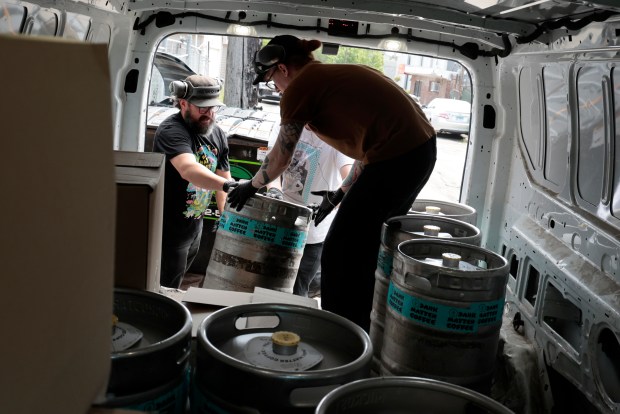
“I tell people: its like really good coffee is like really good music … it gets really weird,” Doggett said. He also offers limited edition coffee with unique processing or cultivars, in addition to his core line.
Restaurant group Lettuce Entertain You recently entered the market via their Beatrix Coffee Roasters subbrand, launching black 12 oz. cans in December 2023. They work with Sip Factory.
Lettuce partner John Economos helped found Beatrix’s coffee brand. Before the launch of the cans, cold brew accounted for 40% of coffee sales during the summer months. But Economos said they didn’t decide to start canning their product based on customer demand.
“It was more so just us wanting to try it based on what we see being popular,” Economos said. “We definitely stand by the quality of products and we’re proud to be able to can it and have it on shelves next to other well-known big brands.”
The recipe: Cold brew or canned heat?
Early advocates for cold brew waged a campaign over the past decade-plus to change how cafes previously brewed coffee cold, where a barista would simply dump hot coffee over ice without a recipe. In 2015, La Colombe wrote that “cold brew has more caffeine and less acidity than hot-brewed coffee, so it’s gentler on your stomach.”
Cold brew became synonymous with cold coffee, but now the tide is flowing hot again. Brewers such as Intelligentsia and Dark Matter argue it’s all about the recipe used and that drip brewing with 200-degree water can be equally effective or better for producing delicious cold coffee.
Snapchill, a Wisconsin co-packer, specializes in this hot-to-cold style with patented technology that involves “brewing coffee hot and rapidly chilling it, locking in flavor without chemicals, additives or flavor compromise.” Despite a voluntary recall of Snapchill’s canned products, companies like Metric said they still believe Snapchill and other hot brew styles are best suited to their side of the specialty markets.
“We like the flavor you get out of a hot brew,” Quinlan said.
But many companies still favor cold brew for convenience and flavor.
Metropolis’ current co-packer, Sip Factory (previously Drip Drop Beverages), specializes in cold brew. A home recipe for cold brew involves immersion and steeping of rough grounds in water; some companies still use this method. But Sip Factory’s Ferrazzuolo said they make a “pressurized brew” within 40 minutes by adding a cold mist, akin to an espresso-makers steam.
“That creates a nice smooth extraction without any bitter or acidic tastes,” Ferrazzuolo said.
Working with a co-packer such as Sip made sense to Metropolis’ Dreyfuss for a variety of reasons, but his concerns about food safety made it a necessity.
“I don’t feel comfortable making (cold brew) myself,” Dreyfuss said. “I don’t know enough about making a cold ready-to-drink coffee product.” Instead, they contracted out the production to Sip, while dialing in a flavor that they felt would have broad applications as a mixer.
Large-format, meaning kegs and concentrate, is Metropolis’ primary, most profitable and widest-spread cold brew product. The cans are, for now, more expensive and more logistically complicated. But they’re still growing all of their products as the company’s cold brew sales have nearly doubled every year since 2021.
“We expect that to be closer to 600% growth in 2024,” said Metropolis CEO Anne Djerai in an email. “We’ve innovated with Nitro products, private label cans and a cold brew concentrate.”
Growing pains
The companies I spoke to, in general, have been very pleased with their experience with co-packers, but it does come with risks. The industry has faced a few recalls, the most recent of which was Snapchill in June. This affected Intelligentsia and Metric cans. According to a news release, Snapchill had not filed their “low acid canned foods process for manufacturing the recalled products,” leading to a potential risk of botulin toxin. Intelligentsia declined a request for comment.
In an exclusive statement to the Tribune, a Snapchill representative said “from the beginnings of our company to date, we have tested hundreds of batches of Snapchill coffee and no contamination has been found.” They said they plan to work with the FDA to ensure future filing and to continue to test their cans. Consumers are encouraged to destroy or return any cans produced and distributed by Snapchill.
Every company I spoke to said they considered sanitation a top priority and noted that the canned cold brew category being relatively young meant there would be some growing pains.
Doggett of Kyoto Black said the risk is extremely low and that the issue with botulism is not about sanitation, but about process.
“Anything that the liquid touches that is a point of possible contamination,” Quinlan said. “So we have to make sure all of those things are sanitized and controlled and repeatedly cleaned.” Adding milk and cream complicates those processes, so for now, most local businesses are sticking to black.
The other issue is the question of shelf stability.
“Cold brew is in a weird category because it’s not a completely has-to-be-cold all the time product,” Doggett said. “But it’s also not a shelf-stable product.” Customers are encouraged to keep their canned coffee refrigerated when possible.
Metric’s Kumaran said they plan to still work with Snapchill. “There was no contamination found,” Kumaran said. “Only out of an abundance of caution, they put in a recall.”
La Colombe in Chicago
The canned coffee trend is big enough that national players see Chicago as a major market.
In December 2023, Greek yogurt giant Chobani paid $900 million to acquire La Colombe, the Philadelphia cafe chain known for its canned and draft cold coffee. Three months later, the new partnership launched its first product in Chicago: 11 oz. draft latte cans in a full range of flavors, including black cold brew. La Colombe had seen outsized popularity for cold brew in the Windy City, even in cold March weather.
“We’ve consistently seen Chicago pop as a cold coffee-obsessed market,” said Kathryn O’Connor, La Colombe’s chief marketing officer.
La Colombe has 32 cafes nationwide, but only five in Chicago. Their data showed disproportionate love for cold brew in Chicago. La Colombe said that 56.6% of their cold brew sales came from Chicago.
It speaks to the winds blowing toward Chicago as a national cold brew capital where roasters of all levels can compete and innovate.


